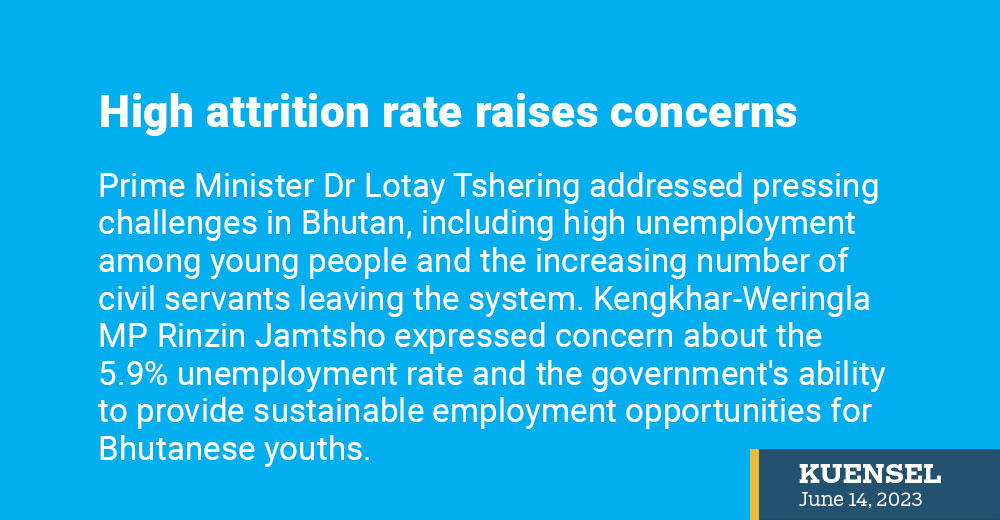
During a question-and-answer session at the National Assembly yesterday, Prime Minister Dr Lotay Tshering faced a barrage of inquiries regarding the pressing challenges facing the country. The majority of the questions focused on issues such as the high unemployment rate among young people and the increasing number of civil servants leaving the system in recent years.
Kengkhar-Weringla MP Rinzin Jamtsho expressed concern about the country’s unemployment rate of 5.9 percent, with nearly 30 percent of young people unable to find jobs. Given the current economic situation, doubts lingered about the government’s ability to provide sustainable employment opportunities for Bhutanese youths, he said.
MP Karma Lhamo from Mongar highlighted the attrition rate of nine percent among civil servants. Beyond the issue of pay revision, the MP sought clarification on the government’s plans and policies for retaining civil servants.
The gravity of the situation was further underscored by the significant increase in teacher resignations. While the annual average voluntary resignation rate for teachers stood at 180 in the past, a staggering 475 teachers have left the system in the last five months.
The Prime Minister acknowledged these concerns but emphasised that the issues at hand were not unique to Bhutan, as unemployment remains a global phenomenon. Regarding the youth unemployment rate, the Prime Minister pointed out discrepancies in surveys that include individuals as young as 15 who are not actively seeking employment.
A substantial number of unemployed youth are currently engaged in the de-suung skilling programme and water projects, where they undergo training. This participation, the Prime Minister said, could contribute to the inflated unemployment figures. As of now, there are approximately 7,000 young individuals in the de-suung skilling programme and 4,000 involved in water projects across the country.
The Prime Minister recognised the gap between job skills and the expectations of young people, emphasising the need to produce skilled individuals to bridge this divide. To enhance employability, the government has implemented changes to university courses. However, despite the growing job opportunities, they may not meet the expectations of Bhutanese youth.
“The manufacturing and construction sectors, which employ approximately 50,000 foreign workers, face a lack of interest from Bhutanese youth,” said the Prime Minister.
Addressing the escalating attrition rate among civil servants, the Prime Minister acknowledged the need for investment plans to retain talent. However, he said that individuals seek opportunities in developed countries with better remuneration and working conditions, making it challenging to prevent their departure.
The Prime Minister provided examples, citing a significant decline in the number of candidates applying for 40 master’s degree slots in the National Referral Hospital.
To combat these challenges, the government has initiated retention plans, including increasing the retirement age. However, the Prime Minister emphasised that resolving these issues would not happen overnight, underscoring the complexity of the task at hand. Plans such as building retirement homes, improving retirement benefits, and allowing young graduates to sit civil service exams twice a year are currently being considered.
Addressing the attrition rate and ensuring a sustainable workforce requires a comprehensive and long-term plan, the Prime Minister said.












